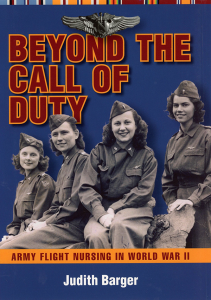Meet the former US Army flight nurses whom I interviewed for
Beyond the Call of Duty: Army Flight Nursing in World War II.
In 1986 as part of my research about flight nurse history and coping with war, I was privileged to interview 25 former US Army nurses about events of their flight nurse duty in World War II. Most of them are now deceased, but their stories live on in Beyond the Call of Duty: Army Flight Nursing in World War II.
The journal I kept of my time with each of them in 1986 when writing my dissertation offers a brief personal glimpse of these remarkable women. I am sharing edited versions of these journals, in the order in which the interviews took place. The actual interviews are in separate documents.
17th Interview
Louise Anthony de Flon
816 MAES Europe
23, 24 May 1986
When I first heard Louise talking with other flight nurses at the World War II Flight Nurses Reunion at Cocoa Beach, Florida about some of her experiences as a flight nurse, I knew I would like to interview her. But for some reason I had it in my mind that she might not consent to an interview. She seemed to me rather unapproachable, and I was a bit intimidated by her very outgoing style. She lives in Spain, and that set her a bit apart from the others attending the reunion. I thus was very pleasantly surprised when Louise asked me if I would want to interview her. I agreed, of course.
Louise is a woman intent on preserving the history of the flight nurses of World War II, and she saw my dissertation as one means to achieve this. She had many experiences that she felt needed to be recorded, some of them about her chief nurse. We both had our own agendas for the interview, but these agendas were not at cross-purposes. The length of our interview required that we break for a planned dinner and resume and conclude the interview the next morning. Louise related a number of experiences quickly and easily, needing only minimal guidance. We could have talked for hours. The experiences Louise shared are valuable and provide interesting examples of how one flight nurse coped with some particularly trying situations during the war. The story of how she dealt with a patient death on a flight out of France across the English Channel, for example, shows the compassion and resourceful thinking that marked the work of a good flight nurse. Louise’s determination to continue her flight nurse duties despite lingering pain from a back injury incurred during flight nurse training shows the determination with which she approached her wartime work.
One problem with the interviews conducted at the reunion was that I had to work them into available time not already scheduled for meetings, meals, and other planned activities. Another problem was that the reunion was one day shorter than had been publicized, leaving one less day for interviews.
Some of Louise’s stories: To Louise, the decision to enter the military was an easy one. “There was no decision to be made — it had already been made. War had been declared.” With two brothers who would be in the service, as well as cousins and nephews, there was no question that she would join, too. Louise was single, and “couldn’t have stayed out had I wanted to.” She had to talk herself into the proper attitude, though, because she had been quick to move when her civilian nursing jobs grew stale, and Louise knew that once in the military, you had to stay in, jump when they told you to jump, and you couldn’t say “I quit.” When Louise finally made the decision, she was sent to Gardner Field, California, where she applied immediately for the flight nurse course but had to wait over a year before she finally received her orders to Bowman Field. “I was so happy, if someone had handed me $50,000, I couldn’t have jumped for joy more.” When, after graduation, Louise and the flight nurses of her squadron were at Camp Kilmer, New Jersey, awaiting shipment overseas, they were expected to stand reveille in the cold winter mornings. When complaints got back to their chief nurse that her flight nurses were not standing reveille, their chief said, “Well, we’re shipping out overseas. And if you think I’m going to make them stand it out in the cold, and they’ll catch pneumonia or something else — They’re standing it inside.” So she called a meeting and told her nurses, “You are standing reveille every morning — I don’t care if you stand it in bed. But you are standing reveille.” Louise laughed as she recalled the incident.
Louise died in 1995.


